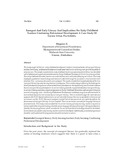Please use this identifier to cite or link to this item:
https://cris.library.msu.ac.zw//handle/11408/695Full metadata record
| DC Field | Value | Language |
|---|---|---|
| dc.contributor.author | Muguwe, Emely | - |
| dc.date.accessioned | 2015-10-02T13:38:56Z | - |
| dc.date.available | 2015-10-02T13:38:56Z | - |
| dc.date.issued | 2013 | - |
| dc.identifier.issn | 1815-9036 | - |
| dc.identifier.uri | http://hdl.handle.net/11408/695 | - |
| dc.description.abstract | The study sought to find out early childhood development teachers’ conceptualisation of emergent literacy and how continuing professional development could assist teachers in nurturing emergent literacy skills in early learners. The sample consisted of six early childhood teachers purposively selected from two identified well established and registered preschools and one Early Childhood Development Centre at a primary school. Two early childhood education teachers were selected from each institution following set criteria. The study employed a qualitative research design and data were collected through the use of semi- structured interview schedules. Five curriculum documents were analysed. The results revealed that conceptualisation of the term ‘emergent literacy’ by early learning teachers is ambiguous. There is also a danger of forcing the kindergarten literacy development programme into preschool literacy development, thereby focusing more on school readiness than on emergent literacy development. In-service training lacks the required details about emergent literacy. In-service training includes a degree programme in Early Childhood Education and emergent literacy is covered in Language Arts. Continuing Professional Development workshops range from administrative to instructional based, but not necessarily on emergent literacy. There is no fixed budget for materials and equipment for ECD. Special needs learners are not catered for because there are no specialists in that area and no resource unit for ECD. Document analysis revealed that all documents do not explicitly address the phenomenon of emergent literacy. It is just implied. There are no teacher manuals for language literacy at preschool levels. The study recommended that In-service training of early learning teachers requires an intense model of learning and training which focuses on language literacy and emergent literacy development. Quality literacy programmes which incorporate the use of educational technology should be developed. Instructional manuals for early learning teachers need to be developed. Additionally, preschool programmes should be well funded and the programmes should be inclusive in nature. | en_US |
| dc.language.iso | en | en_US |
| dc.publisher | Midlands State University | en_US |
| dc.relation.ispartofseries | The Dyke;Vol. 7, No. 3; p.110-128 | - |
| dc.subject | Emergent literacy, early learning teachers; Early learning; continuing professional development | en_US |
| dc.title | Emergent and early literacy and implications for early childhood teachers continuing professional development: a case study of Gweru urban pre-cchools. | en_US |
| dc.type | Article | en_US |
| item.fulltext | With Fulltext | - |
| item.openairetype | Article | - |
| item.languageiso639-1 | en | - |
| item.cerifentitytype | Publications | - |
| item.grantfulltext | open | - |
| item.openairecristype | http://purl.org/coar/resource_type/c_18cf | - |
| Appears in Collections: | Research Papers | |
Files in This Item:
| File | Description | Size | Format | |
|---|---|---|---|---|
| muguwe.pdf | Full Text | 284.24 kB | Adobe PDF |  View/Open |
Page view(s)
18
checked on Jul 26, 2024
Download(s)
16
checked on Jul 26, 2024
Google ScholarTM
Check
Items in MSUIR are protected by copyright, with all rights reserved, unless otherwise indicated.


